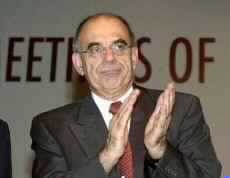BONN, Germany (Reuters) - Officials from some 180 nations haggled on Tuesday over the fine print of a deal to salvage the Kyoto accord -- agreed in principle -- which will force most rich nations to cut greenhouse gas emissions. (Read photo caption below).
Technical delays held up formal agreement of the compromise text, however. It was due to take place on Wednesday.
Exhausted but relieved after four days and a night of talks in Bonn, ministers had left their officials on Monday to thrash out details of the historic compromise, which leaves out the United States.
A meeting of all delegations which was expected to set the United Nations seal of ``formal adoption'' on the compromise plan was put off until Wednesday.
``It will be adopted. It's just a technical question,'' meeting chairman Jan Pronk, the Dutch environment minister, told Reuters.
Weary ministers passed the text on the nod on Monday, Pronk simply asking for objections and instantly banging his gavel. U.N. procedure, however, requires legal translation from English into five other languages and rather more rigorous approval methods.
LATE DISCUSSIONS
Discussions ran on late on Tuesday, leaving insufficient time for the adoption as Pronk was due to host a party for U.N. staff and negotiators and adjourned the plenary meeting.
Delegates said there would be discussions about the wording of the texts but were confident they would be able to draft the detail within the political compromise agreed by ministers.
The U.S. delegation denied speculation it was about to put up resistance to the deal in the plenary meeting.
U.S. spokesman Paul Kozelka repeated assurances made throughout the week from the U.S. delegation that Washington would do nothing to prevent other states from adopting the Protocol so long as it did not harm American interests.
A senior European negotiator said U.S. delegates had told him the same: ``They have assured me they will not reopen the debate.''
Russian delegation chief, Alexander Bedritsky, thwarted Pronk's attempt to deal with some procedural matters before the plenary meeting was adjourned. He objected to the chairman's request to hold talks in English only, letting interpreters leave.
WILL NOT OBSTRUCT ADOPTION
But Bedritsky told Reuters he would not obstruct adoption of the text: ``We have comments to make on some of the documents but there will not be a problem,'' he said.
It was not the first time the language issue had been raised in the tense meetings and may be a foretaste of further wrangles over texts. One former Soviet delegate, backing the Russian demand for translation, criticized Pronk's efforts to speed things along.
``It's like the Plenary Assembly of the Communist Party of the Soviet Union. We're supposed to just sit here and agree,'' he said.
The officials will work until Friday on turning the political agreement into a legal document that should let the Kyoto Protocol come into force next year once individual states ratify it.
Tokyo broke the deadlock in Bonn early on Monday when it said it would back a draft agreement over how the treaty, born in Japan in 1997, would come into force, despite President Bush's withdrawal from the pact in March.
Among key areas of wording to be worked on will be the one that delayed Japan's agreement -- what sort of mechanisms should be used to force signatories to stick to targets for cutting greenhouse gas emissions by the end of the decade.
Environmentalists were not happy about the watering down of the deal but said at least the Bonn agreement made a start to curbing the dangerous warming of the Earth's climate and the threat of rising sea levels due to melting ice caps.
PHOTO CAPTION:
Conference chairman Dutch Environment Minister Jan Pronk applauds the delegations following the closing of climate talks in Bonn, western Germany, Monday, July 23, 2001. Negotiators from 178 nations rescued the 1997 Kyoto Protocol after 48 hours of marathon talks ending Monday, leaving the United States isolated as the rest of the world embraced the first binding treaty on combating global warming. (AP Photo/Hermann J. Knippertz)
- Jul 23 11:37 AM ET
- Author:
Reuters - Section:
WORLD HEADLINES


 Home
Home Discover Islam
Discover Islam Quran Recitations
Quran Recitations Lectures
Lectures
 Fatwa
Fatwa Articles
Articles Fiqh
Fiqh E-Books
E-Books Boys & Girls
Boys & Girls  Articles
Articles










